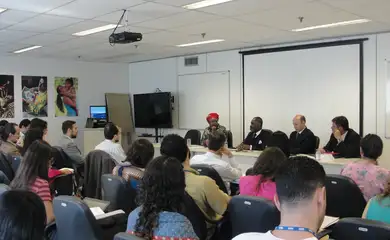Capoeira to be recognized as cultural heritage of humanity


Capoeira: a dance form, a martial art, and a symbol of resistance among black people in the time of slavery. 

A dance form, a martial art, and a symbol of resistance among black people in the time of slavery. These are some of the reasons why the United Nations Scientific and Cultural Organization, Unesco, is to grant capoeira the status of cultural heritage of humanity. The announcement is expected to be made next week, in Paris, by Unesco's Intergovernmental Committee for Safeguarding of Intangible Cultural Heritage. The request for the acknowledgement was the only one submitted by Brazil, and one of the three Latin-American items on a list with 46 other applications, put together by member countries.
In the document, the National Historical and Artistic Heritage Institute (Iphan) points out that the recognition will raise awareness about the legacy of African culture in Brazil and the key role of capoeira in fighting racism and prejudice. The text further mentions that capoeira, now popular worldwide, was one day considered a crime.
“Capoeira is a cultural expression of several dimensions. At once a martial art, a dance and a game, it is so intimately connected with our history, our society, that it becomes part of what the Brazilian people is,” explained Célia Corsino, Iphan director of the Immaterial Heritage Department.
Already recognized as cultural heritage by Iphan since 2008, capoeira brings people together through singing and the use of traditional musical instruments, like the berimbau and the atabaque. Participants stand in a circle, at the center of which blows and dance moves are performed which are difficult to be told apart by outsiders.

Capoeira brings people together through singing and the use of traditional musical instruments, like the berimbau and the atabaque.
“Capoeira is not just a game, it's much more than that. Its history can't be stripped away from the history of the nation. It's been used in wars, like the War of Paraguay,” says Paulinho Salmon, who has been a capoeira enthusiast and a teacher for over 50 years. He is one of the capoeira masters, or mestres, from a committee in Rio which discusses safeguarding measures with Iphan.
The strategies built by the mestres in an attempt to protect capoeira, along with Iphan's decision to recognize it as heritage of humanity can also be found in the document addressed to Unesco. Among them is their request to turn capoeira into a mandatory school subject. According to data from Iphan, capoeira is practiced nationwide.
The application also mentions actions like the national registration of capoeira as a cultural good, and the creation of work groups and meetings with members of society and government agencies. For the future, with capoeira's new status as cultural heritage of humanity, measures will be an effort to promote and legitimate its African legacy in Brazil, as well as to locate capoeira groups and their masters across the country.
In the document, Unesco's technical committee highlights that capoeira was born out of resistance against prejudice and helps promote tolerance and inclusion among people. “[Capoeira] functions as an expression of mutual respect among communities, groups, and individuals, and promotes social integration and the remembrance of the resistance against historical oppression.”
Translated by Fabrício Ferreira
Fonte: Capoeira to be recognized as cultural heritage of humanity






